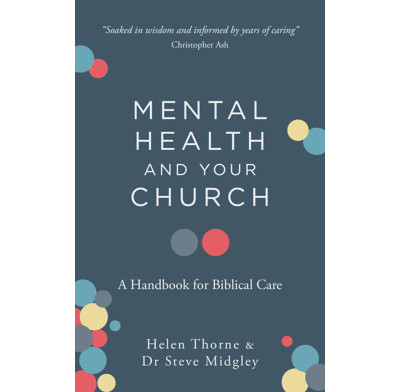There are at least three reasons it’s worth reading this new book on helping people with mental health struggles.
1. Mental Health and Your Church is written for ‘ordinary church members.’ It contextualises the intensely practical doctrine of the priesthood of all believers. It takes seriously the biblical teaching on mutual care for each other in all sorts of challenging life circumstances, applying it wisely to the complexities of 21st century churches. These complexities include an apparent increase in mental health disorders and the relatively recent rise of a growing, predominately secular, mental health system that operates in areas that overlap the traditional concerns of Christian growth and ministry. And there are historical weaknesses in training pastors to equip themselves and their people in all that biblical pastoral care entails. We do need to know how to do more than listening, prayer, and referral—as important as those things are![1]
2. Authors Helen Thorne and Steve Midgley write from a UK context. It seems to me that Brits and Aussies have some things in common that we don’t always share with the various American sub-cultures that influence our pastoral care models. So, it’s just nice to see some different ways to do things that resonate with my feel for what church life is like in Australia—or what it could be.
3. Before going into pastoral ministry, ending up as rector of Christ Church, Midgley was a Cambridge-educated medical doctor who trained in psychiatry. He clearly retains a good appreciation of the value of his former profession—along with some of its limitations. This ‘insiders’ view is so important. As such, this is not a book aiming to take over or replace psychiatry. It is positively written to help equip our churches do all they can do to help in addition to what professional mental health services can offer.

Mental Health and Your Church: A Handbook for Biblical Care
Mental Health and Your Church: A Handbook for Biblical Care
There are brothers and sisters in our church families battling with thoughts, feelings, impulses, and even voices that distract, drag down, and nudge them towards despair. But when it comes to helping, it can be tricky to know where to begin, especially if we have very little knowledge of mental illnesses and are afraid of making things worse by saying and doing the wrong things.
This wise, compassionate, and practical book is written by Steve Midgley, psychiatrist and Executive Director of Biblical Counselling UK, and Helen Thorne, Director of Training and Resources at Biblical Counselling UK. It will help readers understand and respond with biblical wisdom to people who are struggling with their mental health.
What’s in it?
It’s a small book of around 180 pages divided roughly equally into three main sections:
Section 1 on understanding mental illness carefully explains what mental illnesses are. It considers mental health issues, talking therapies, and medications from a Christian worldview perspective that I found, as a Christian counsellor and medical practitioner, to be balanced. It addresses the unhelpful ‘switch’ that can occur when people define a mental health problem as either a medical/psychiatric issue or a pastoral/spiritual one, when it is usually both—in varying proportions.
People define a mental health problem as either a medical/psychiatric issue or a pastoral/spiritual one, when it is usually both—in varying proportions.
Section 2 on how we can help starts by saying that doing nothing is not an option for churches. But doing everything isn’t an option either—as an obvious example, churches don’t have their own medical systems. That leaves us with a large area we can work with that is helpfully unpacked with plenty of practical examples under these five headings: the call to raise awareness; to relate; to remember; to refine; and to practically resource. Section 2 rounds off with a ‘common questions’ chapter. Amongst many good discussions here, I appreciate the careful thought given to issues of confidentiality that inevitably arise in church contexts when churches are caring for each other as they should.
Section 3 on caring in practice more fully develops the stories of helping the four people we were introduced to in chapter 1. Chi has an anxiety disorder with panic attacks. Andy has major depression. Siobhan has a history of abuse and alcohol and drug addictions. Ben has schizophrenia and still suffers with psychosis at times. There’s a very important chapter on ‘caring for the carers’ that considers how to support Kelly as she cares for her self-harming and eating-disordered teenage daughter.[2]
What are the highlights?
The way the churches care for Chi, Andy, Siobhan, and Ben in the case studies is very attractive and rings true for me. Their suffering feels real, and the help provided by their churches is significant, multidimensional, and believable. We can all learn from these case studies.
It speaks to us as members of Christ’s body in local congregations. It’s not about how I as an individual can have my own pastoral care ministry as a lone ranger helping our most deeply troubled people, but about how whole church fellowships can work together. This is real love in action in true community in a way that nothing else matches. Anywhere.
This is real love in action in true community in a way that nothing else matches. Anywhere.
Limitations?
While it covers so much ground with insight and practicality in so little space, it is a short book for such big topics. It strives for balance admirably, but just can’t provide all the nuances that some will want—whether for the spiritual factors or the brain-based bodily factors that can dominate in some mental health struggles. The authors acknowledge the book won’t make anyone an expert, and an appendix provides some suggestions for further reading.
Closing thoughts
Mental Health and Your Church is what it sets out to be—a handbook for churches. It’s sufficiently deep and detailed to give plenty of good ideas for leaders trying to equip their people to follow Paul’s call to mutual ministry when he says:
We urge you, brothers and sisters, admonish the idle, encourage the fainthearted, help the weak, be patient with them all. (1 Thess 5:14)
This comprehensive call to care for each other encompasses the range of mental health issues that we face. Whatever the problem, and whatever resources external to the local fellowship might be involved, we are all called to love each other practically from the heart with wisdom—with the word of Christ dwelling deeply in our conversations. Thorne and Midgley have drawn an attractive and realistic vision of what this could look like in your church and mine.
Steve Midgley will be in Australia in August 2023
[1] While teaching at Westminster Seminary, Philadelphia in 1964, J I Packer gave the graduation address. Against contemporary practice, Packer defined pastoral care in terms of the ‘public and private ministry of the Word of God.’ ‘It’s not enough to visit and show sympathy,’ he said. And he went on to consider some ways to care for those facing ‘trouble, loneliness, and special personal difficulty.’ He expressed passionate concerns about exchanging Word-based ministry of the cross for ‘fashionable techniques of so-called pastoral psychology that rest on a secular analysis of human nature, and which, when used, have the effect of leading men and women out of sight of the cross, and teaching them to look elsewhere for the healing of their souls.’ This critique fitted Westminster’s pastoral care class at the time. With the whole seminary hearing the address, it appears likely to have contributed significantly to the revolution that followed. One year later, the precursors of modern biblical counselling began to be conceptualised at the seminary, going on to grow and be refined by many over the years. Decades later, Thorne and Midgley trained in the CCEF-type pastoral care approach that the seminary is now known for.
[2] A discussion guide for church leadership and care teams is available online.










